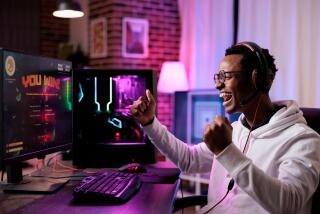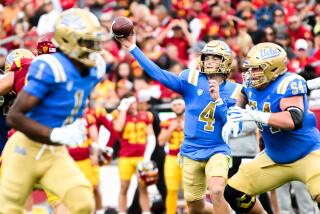Battling in Fallouja 1 Minute, in ‘Halo’ the Next
CAMP FALLOUJA, Iraq — Soon after the battle for Fallouja ended in November, U.S. Marines brought their Xbox consoles, Gameboys and laptops forward and started fighting the Covenant hordes in “Halo,” Mario and Luigi’s worst enemies and those irksome roommates from “The Sims.”
At the Marine base several miles southeast, high-speed wires snake down hallways, through doors and out windows. The Navy engineers play “Half-Life 2.” At the gym, where seven Playstations get heavy use, Marines wage “Madden NFL 2005” tournaments. “Neverwinter Nights” reigns in the public affairs office.
The video game generation has grown up and gone to war, taking along its preferred form of entertainment.
Never has that been clearer than during the current Iraq conflict and at Camp Fallouja, where Marines and soldiers play because they’ve been playing all their lives. Games relieve both the stress of warfare and the crush of boredom.
“You keep focus on what we’re here for, but you’ve got to go somewhere else sometimes,” said Staff. Sgt. Robert Sloan, 26, a communications maintenance chief from McDonald, Ohio. “Sometimes you read too many books.”
Games are as ubiquitous at Camp Fallouja and around it as tattoos, buzz cuts and shouts of “Hooah” from one Marine to another.
When the power goes out, a Humvee battery and a pair of alligator clips are all the resourceful gamer needs to resume the digitized fight.
The military has long brought the newest technology with it to war zones -- and then provided for those who forgot to bring what they wanted. At the post exchange in Camp Fallouja, a stack of Playstations and Xboxes share an aisle with DVD players, televisions and microwave ovens.
The “Game Zone” sits in the corner, stocked with some 20 game titles across the aisle from racks full of box sets from the band Nirvana and DVDs of the ‘70s TV comedy “Three’s Company.”
“Everything we get in sells right out. Entertainment is entertainment,” said Staff Sgt. Franklin Williams from Summersville, Mo., an exchange specialist at the P/X. “They like the latest games -- military games, car games, everything with speed.”
Psychologists who treat combat stress recommend video games for Marines to unwind and boost morale.
“I always talk to people about all kinds of positive, pleasant events that they can use,” said Lt. Erin Simmons of Baltimore, a psychologist with Bravo Surgical Company. “I’ve heard some people say they like to play the video games with the aggressive military content. I’ve also heard people say they don’t want to play those types of games; they don’t need to be reminded of it. But as far as a pleasant event, it can take their mind off things, help them relax. We encourage it.”
The activity is highly social as service personnel place bets on the outcome of sports games and jeer at one another during multiplayer rounds of “Halo.”
It also helps alleviate homesickness. A “Morale, Welfare and Recreation” center just off the gym is filled with Playstation 2 consoles. Marines back from the fight stop in for a few hours to unwind.
The military awoke to the power of video games years ago.
It developed “America’s Army” as a recruitment tool, giving civilians a taste of the soldier life with scenarios that let players cooperate online in raids on guerrilla camps and bridges, among others.
Some branches of the service have incorporated games into their training and then sold off commercial versions -- “Operation Flashpoint” was one, and the Marines for the first time are helping produce their own game, called “Close Combat: First to Fight.”
On the base, Marines who have seen combat say they were aided by games they had played beforehand. Those games, they say, taught them how quickly something can go wrong.
For instance, in the hyper-realistic “SOCOM 2: U.S. Navy Seals” for Playstation 2, players issue commands to their teams in a highly coordinated ballet of violence.
“When we cover houses, you got your guys coming in behind you covering your flank,” said Lance Cpl. Patrick Hopper, 23, of Heber Springs, Ark. “When you take over a house and you’re playing SOCOM, you kind of get used to it when you get there.”
Certainly some games are more popular than others. Few people had purchased the puzzle game “Tetris Worlds” or “The Hobbit,” aimed at kids. Rows of Nintendo’s “Metroid Prime: Echoes” for the GameCube console went untouched, probably because the Xbox and Playstation are far more popular here.
Thirty copies of “Halo 2” disappeared in hours. Some soldiers bought the game even though they didn’t even have an Xbox, while others bought an Xbox just so they could play.
But Marines scoff at the idea that games could somehow prepare them for combat in any significant way. In video games, they say, players are generally willing to risk their lives; that wasn’t always the case in Fallouja.
“When bullets are zooming by you, there’s nothing like it,” said Sgt. Jeffery Mickel, 27, of Rialto, Calif. “Some guys get scared and take cover; other guys go right ahead and take care of the threat.”
Games have also not caught up with reality: civilians blending in with insurgents, and soldiers unable to distinguish between them.
Nor do games cover the types of scenarios faced in combat.
“In a game, you can die and press ‘start’ and go all over again. This is a little bit different,” said Sgt. James Atakoglu, 28, of Augusta, Ga., who drove a bulldozer during the battle for Fallouja, often smashing down buildings where insurgents were believed to be hiding. “I don’t think games are going to have a ‘dozer crashing into a building.”
More to Read
The biggest entertainment stories
Get our big stories about Hollywood, film, television, music, arts, culture and more right in your inbox as soon as they publish.
You may occasionally receive promotional content from the Los Angeles Times.










